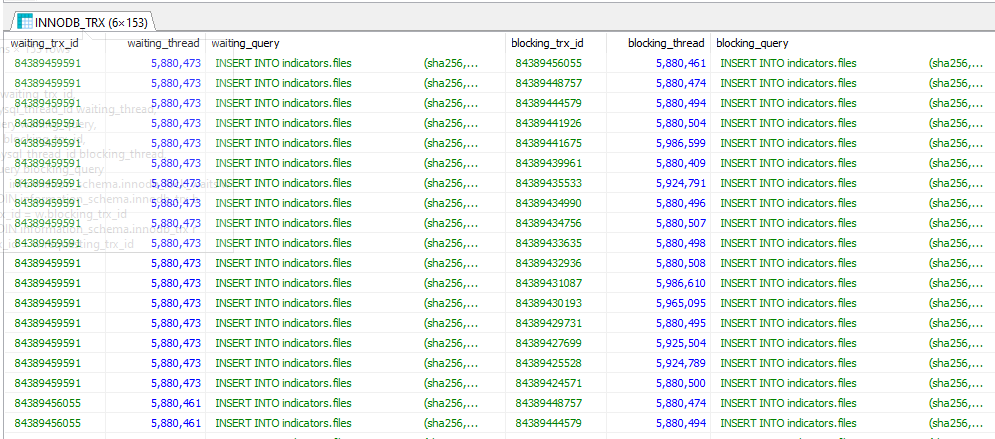I have a table files with about 73m rows, which totals to about 45GB.
The rows being inserted in a day are about 100k. But the total rows which we run IODKU can reach tens of millions a day (since many of the files are sent over and over again from different clients)
We are updating mainly the lastSeen column.
This is the table:
CREATE TABLE `files` (
`id` int(11) unsigned NOT NULL AUTO_INCREMENT,
`sha256` binary(32) NOT NULL,
`md5` binary(16) DEFAULT NULL,
`sha1` binary(20) DEFAULT NULL ,
`riskLevel` smallint(6) NOT NULL DEFAULT '0' ,
`lastRA` timestamp NULL DEFAULT NULL ,
`dateIn` timestamp NOT NULL DEFAULT CURRENT_TIMESTAMP,
`lastSeen` timestamp NOT NULL DEFAULT CURRENT_TIMESTAMP,
`CommonFileName` varchar(150) DEFAULT NULL ,
`CommonPath` varchar(350) DEFAULT NULL ,
`CommonExtension` char(5) DEFAULT NULL,
`state2` tinyint(3) unsigned NOT NULL DEFAULT '0',
`numComps` smallint(5) unsigned NOT NULL DEFAULT '0',
`numClients` smallint(5) unsigned NOT NULL DEFAULT '0',
`underAnalysis` tinyint(3) NOT NULL DEFAULT '0',
PRIMARY KEY (`id`),
UNIQUE KEY `sha256` (`sha256`),
KEY `lastSeen` (`lastSeen`),
KEY `dateIn` (`dateIn`),
) ENGINE=InnoDB DEFAULT CHARSET=utf8 ROW_FORMAT=COMPACT
I can see many locks:
SELECT
r.trx_id waiting_trx_id,
r.trx_mysql_thread_id waiting_thread,
r.trx_query waiting_query,
b.trx_id blocking_trx_id,
b.trx_mysql_thread_id blocking_thread,
b.trx_query blocking_query
FROM information_schema.innodb_lock_waits w
INNER JOIN information_schema.innodb_trx b
ON b.trx_id = w.blocking_trx_id
INNER JOIN information_schema.innodb_trx r
ON r.trx_id = w.requesting_trx_id;
We are inserting in batches of 200, with around 20 parallel insert threads (no other concurrent updates on this table).
I am thinking of possible solutions:
- Caching the data in application level and inserting every x minutes using 1 thread
- Same as solution 1 just with a cache table in DB
- Maybe this is an architectural issue and we shouldn't sync the same file so many times?
EDIT
This is an example of an insert batch:
INSERT INTO indicators.files (sha256, MD5, SHA1, riskLevel, lastRA, lastSeen, CommonFileName, CommonPath, CommonExtension, numComps, numClients, maxRiskLevel)
VALUES (....) ON DUPLICATE KEY
UPDATE lastSeen = NOW()
Can't add the engine status because it's too big, but this is interesting from the engine status, I see many:
---TRANSACTION 84423352921, ACTIVE 11 sec setting auto-inc lock
mysql tables in use 2, locked 2
LOCK WAIT 4 lock struct(s), heap size 1184, 2 row lock(s)
MySQL thread id 5925505, OS thread handle 0x2b7adef8d700, query id 15526252234 ec2-54-217-206-23.eu-west-1.compute.amazonaws.com 54.217.206.23 root Sending data
INSERT INTO indicators.files
(sha256,md5, sha1, riskLevel, lastRA, lastSeen, CommonFileName, CommonPath, CommonExtension, numComps, numClients, maxRiskLevel)
SELECT sha256, md5, sha1, riskLevel, lastRA, lastSeen, CommonFileName, CommonPath, CommonExtension, 1 ,1, riskLevel
FROM sync6501.files as sync_files
WHERE sha256 IN (0x838A492EBAAA55C3492194BB63DDC31C5151B884CA94546DE59DEF034ECF2C45, 0xF75A9E9421F4736E91BFFB251BFB3797C104FAF67084698C4316A82FC2D86CD9, 0xC7F88106C79ABB3FE49DDBDAC15AFD4B05E67
------- TRX HAS BEEN WAITING 11 SEC FOR THIS LOCK TO BE GRANTED:
TABLE LOCK table `indicators`.`files` trx id 84423352921 lock mode AUTO-INC waiting
Latest Deadlock:
LATEST DETECTED DEADLOCK
------------------------
2019-11-21 07:26:21 2b7ad8585700
*** (1) TRANSACTION:
TRANSACTION 84484300076, ACTIVE 4 sec inserting
mysql tables in use 1, locked 1
LOCK WAIT 1488 lock struct(s), heap size 177704, 1596 row lock(s), undo log entries 878
MySQL thread id 6031119, OS thread handle 0x2b7aa0fce700, query id 15698217319 ec2-54-217-206-23.eu-west-1.compute.amazonaws.com 54.217.206.23 root update
INSERT INTO indicators.Domains (Domain, DomainCRC, last_seen) VALUES ('www2.unimed.coop.br',CRC32('www2.unimed.coop.br'),'2019-11-19 16:59:32'),('www.boticario.com.br',CRC32('www.boticario.com.br'),'2019-11-19 16:59:32'),('13.111.45.227',CRC32('13.111.45.227'),'2019-11-19 17:00:00'),('static.mrosupply.com',CRC32('static.mrosupply.com'),'2019-11-19 17:00:05'),('www.motionindustries.com',CRC32('www.motionindustries.com'),'2019-11-19 17:00:05'),('www.mrosupply.com',CRC32('www.mrosupply.com'),'2019-11-19 17:00:05'),('cic.ironmountain.com',CRC32('cic.ironmountain.com'),'2019-11-19 17:00:12'),('www.albionhotel.net',CRC32('www.albionhotel.net'),'2019-11-19 17:01:42'),('quimicaevestibular.com.br',CRC32('quimicaevestibular.com.br'),'2019-11-19 17:02:00'),('www.megawatsoft.com',CRC32('www.megawatsoft.com'),'2019-11-19 17:02:00'),('corinto.pucp.edu.pe',CRC32('corinto
*** (1) WAITING FOR THIS LOCK TO BE GRANTED:
RECORD LOCKS space id 6220123 page no 2413929 n bits 648 index `Domain` of table `indicators`.`Domains` trx id 84484300076 lock_mode X waiting
Record lock, heap no 568 PHYSICAL RECORD: n_fields 2; compact format; info bits 0
0: len 11; hex 35322e37322e382e313634; asc 52.72.8.164;;
1: len 4; hex 7ffe4a1d; asc J ;;
*** (2) TRANSACTION:
TRANSACTION 84484300765, ACTIVE 2 sec inserting
mysql tables in use 1, locked 1
1428 lock struct(s), heap size 177704, 1775 row lock(s), undo log entries 715
MySQL thread id 5880464, OS thread handle 0x2b7ad8585700, query id 15698219237 ec2-54-217-206-23.eu-west-1.compute.amazonaws.com 54.217.206.23 root update
INSERT INTO indicators.Domains (Domain, DomainCRC, last_seen) VALUES ('r3.res.outlook.com',CRC32('r3.res.outlook.com'),'2019-11-19 16:10:17'),('dynamosoftware.zendesk.com',CRC32('dynamosoftware.zendesk.com'),'2019-11-19 16:10:17'),('secure.gravatar.com',CRC32('secure.gravatar.com'),'2019-11-19 16:10:17'),('imap.gmail.com',CRC32('imap.gmail.com'),'2019-11-19 16:10:17'),('40.97.28.114',CRC32('40.97.28.114'),'2019-11-19 16:10:17'),('40.97.199.114',CRC32('40.97.199.114'),'2019-11-19 16:10:17'),('40.91.91.94',CRC32('40.91.91.94'),'2019-11-19 16:10:17'),('52.114.77.34',CRC32('52.114.77.34'),'2019-11-19 16:10:17'),('40.97.154.242',CRC32('40.97.154.242'),'2019-11-19 16:10:17'),('107.180.41.168',CRC32('107.180.41.168'),'2019-11-19 16:10:17'),('23.221.210.216',CRC32('23.221.210.216'),'2019-11-19 16:10:17'),('52.96.16.162',CRC32('52.96.16.162'),'2019-11-19 16:10:17')
*** (2) HOLDS THE LOCK(S):
RECORD LOCKS space id 6220123 page no 2413929 n bits 648 index `Domain` of table `indicators`.`Domains` trx id 84484300765 lock_mode X
Record lock, heap no 477 PHYSICAL RECORD: n_fields 2; compact format; info bits 0
0: len 12; hex 35322e37322e36312e323031; asc 52.72.61.201;;
1: len 4; hex 4e6229a1; asc Nb) ;;
Record lock, heap no 568 PHYSICAL RECORD: n_fields 2; compact format; info bits 0
0: len 11; hex 35322e37322e382e313634; asc 52.72.8.164;;
1: len 4; hex 7ffe4a1d; asc J ;;
*** (2) WAITING FOR THIS LOCK TO BE GRANTED:
RECORD LOCKS space id 6220123 page no 336162 n bits 744 index `Domain` of table `indicators`.`Domains` trx id 84484300765 lock_mode X waiting
Record lock, heap no 586 PHYSICAL RECORD: n_fields 2; compact format; info bits 0
0: len 13; hex 36362e38352e3133362e313031; asc 66.85.136.101;;
1: len 4; hex 6d1dada2; asc m ;;


lastSeenupdated?Domains, can we seeCREATE TABLE Domains, including all its indexes.